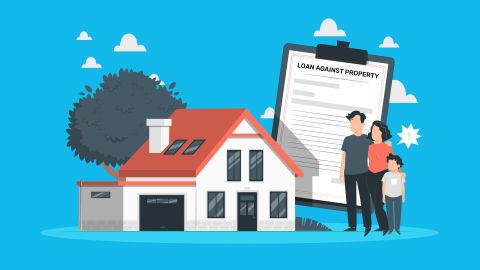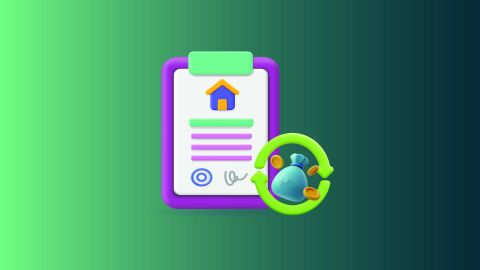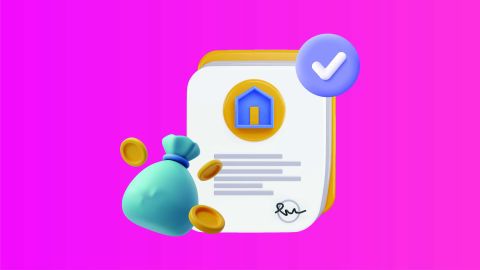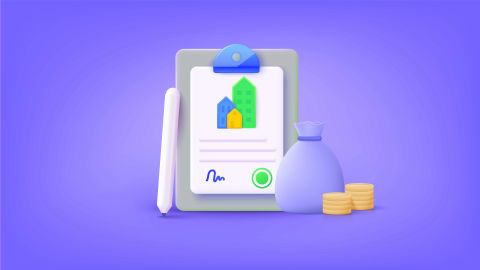A mortgage loan is a secured financial product that allows you to leverage your property to access substantial funds for various needs, such as business expansion, education, medical emergencies, or debt consolidation. Bajaj Finance offers mortgage loans with competitive interest rates, flexible repayment tenures, and high-value sanctions tailored to meet your financial goals. Whether you are looking to unlock your property's potential or consolidate existing debts, a mortgage loan provides a convenient and reliable solution. With a simple application process and quick approvals, Bajaj Finance ensures you have the financial support you need when it matters the most.
What is a Mortgage Loan?
A mortgage loan is a type of secured loan that allows you to borrow funds by pledging an immovable asset as collateral with the lender. The asset can be a residential or commercial property or other immovable properties like heavy machinery. This type of loan is secured on the borrower's property through a process called mortgage origination. A loan for a mortgage offers long-term repayment options, with tenure of up to 15 years and interest rates significantly lower than unsecured loans. You can use the loan amount to fulfil various funding needs, including big-ticket expenditures.
Need funds for multiple purposes without selling your property? A Loan Against Property could be the solution! It is a flexible option that allows you to borrow against your property while retaining ownership. Check your loan against property eligibility in seconds.
Overseas education, a grand wedding, growing business needs, or unforeseen medical expenses – no matter what your need may be, finance them easily with a Bajaj Finserv Mortgage Loan. Bajaj Finserv now offers mortgage loans customised to the needs of salaried and self-employed individuals.
Features and Benefits of Mortgage Loans
-
Reasonable rate of interest
Starting from 8% to 18% (fixed or floating rate of interest), Bajaj Finserv offers allows you to access a higher loan amount at affordable Mortgage Loan Interest Rate.
-
Money in account in 72* hours
No more long waits for mortgage loan amounts with Bajaj Finserv. Find your sanction amount in your bank account in just 72* hours from approval.
-
High value funding
Bajaj Finserv provides mortgage loan up to Rs. 10.50 crore* to eligible candidates. Looking for even more flexibility? Consider a loan against property for personalised funding solutions with high loan amounts and affordable interest rates. Check your loan against property eligibility in just 2 clicks.
-
Digital monitoring
Now keep a close eye on all your mortgage loan developments and EMI schedules through the Bajaj Finserv online platform.
-
Long tenor stretch
The Bajaj Finserv mortgage loan tenor stretches up to 15 years allowing borrowers a buffer period to plan out their EMI payments.
-
Low contact loans
Experience a truly remote loan application from anywhere in India by applying online and getting an easy approval.
-
No prepayment and foreclosure charge
If all borrowers and co-borrowers are individuals, loan availed on floating interest rates, and loan taken for purposes other than business use, then there will be no foreclosure/ part-prepayment charges.
-
Easy balance transfer with top-up loan
Transfer your existing loan to Bajaj Finserv as part of our loan against property balance transfer facility and avail a top-up loan without additional documentation.
Purpose of mortgage loans
The primary purpose of a loan on mortgage is to provide financial assistance to individuals or businesses for the purchase or refinancing of real estate properties. Here are the main purposes of a mortgage loan:
- Home purchase: One of the most common reasons people seek a loan on mortgage is to buy a residential property, such as a house or an apartment. Since properties often have high price tags, most individuals cannot afford to pay the entire amount upfront. A mortgage loan allows them to borrow a significant portion of the property's value and pay it back in instalments over an extended period, usually several years.
- Property investment: Some individuals may use mortgage loans to invest in real estate for rental income or capital appreciation. By taking a loan on mortgage, they can leverage their investment and potentially achieve higher returns over time.
- Business property purchase: Businesses often require office spaces, warehouses, or commercial properties for their operations. Mortgage loans help businesses acquire these properties without tying up significant capital in one purchase.
- Home improvement: Mortgage loans can also be used for home improvement projects, such as renovations or extensions. Borrowers can use the loan amount to upgrade their property, increasing its value and enhancing their living experience.
- Debt consolidation: In some cases, individuals may use a mortgage loan to consolidate high-interest debts, such as credit card debts or personal loans. By consolidating multiple debts into a single mortgage loan, borrowers can benefit from lower interest rates and more manageable monthly payments.
- Refinancing: Homeowners may opt for mortgage refinancing to take advantage of lower interest rates or to change the loan terms to suit their financial situation better. Refinancing can help reduce monthly payments or shorten the loan term.
Types of Mortgage Loans
When looking for financing to purchase a home or leverage property equity, there are several types of mortgage loans available. Here is a detailed breakdown:
Fixed-rate mortgage loans:
These are the most common type of home mortgage loans. The interest rate remains constant throughout the loan term, usually 15, 20, or 30 years. The consistency in monthly payments makes it easier for borrowers to plan their budgets, as the amount due does not change. This type of loan is ideal for individuals who plan to stay in their homes for a long period.
Adjustable-Rate Mortgage (ARM) loans:
In contrast to fixed-rate loans, Adjustable Rate Mortgage ARMs start with a lower interest rate that changes periodically based on market conditions. The initial lower rates can be attractive, but after the fixed period (usually 5, 7, or 10 years), the rates can increase, leading to higher payments. This option may suit those who expect their income to grow or plan to sell or refinance before the rate adjusts.
Jumbo loans:
If you are purchasing a high-value property that exceeds the limits of a conventional loan, a jumbo loanmight be necessary. These loans are used for properties in more expensive real estate markets. They typically come with stricter credit requirements, a larger down payment, and higher interest rates due to the increased risk for lenders.
Interest-only mortgage loans:
With this type of loan, borrowers pay only the interest for a set period (usually 5-10 years), after which they begin paying both principal and interest. These loans can help keep initial payments lower but may result in significantly higher payments once the interest-only period ends. This type of loan can be useful for buyers who expect a financial windfall in the near future.
Loan Against Property (LAP):
A Loan Against Property is a type of mortgage loan where borrowers can leverage the equity in their existing property to meet personal or business financial needs. Unlike a home mortgage loan where the borrowed amount is used to purchase property, an LAP allows the property owner to borrow funds by keeping their existing property as collateral. The loan amount is typically a percentage of the property's current market value. It is a flexible option for accessing significant funds without selling property.
Already own property? Unlock its potential with a loan against property. It is a hassle-free way to meet your financial needs without parting with your asset. This secured loan allows you to access funds while retaining ownership, making it an excellent option for business expansion, education, medical expenses, or debt consolidation. With lower interest rates and flexible repayment terms, a loan against property provides a smart way to unlock your property's financial potential. Check your loan against property eligibility in seconds.
Each of these mortgage types has its own benefits and potential drawbacks. Understanding your financial situation and future plans is essential when choosing the right mortgage loan.
Eligibility Criteria for Mortgage Loan
The following mentioned are criteria to apply for mortgage loan:
Terms |
Salaried Applicants |
Self- Employed |
Nationality |
Resident of India, with a property in any of the locations where we operate |
Resident of India, with a property in any of the locations where we operate |
Minimum Age |
25 years* (18 years for non-financial property owners) |
25 years* (18 years for non-financial property owners) |
Maximum age |
85 years* (including non-financial property owners) *Age of the individual applicant/ co-applicant at the time of loan maturity. *Higher age of co-applicant may be considered up to 95 years on the basis 2nd generation (legal heir) meeting age norms and to be taken as co-applicant on loan structure. |
85 years* (including non-financial property owners) *Age of the individual applicant/ co-applicant at the time of loan maturity. *Higher age of co-applicant may be considered up to 95 years basis 2nd generation (legal heir) meeting age norms and to be taken as co-applicant on loan structure. |
Employment: |
Should be employed at any private, public or multinational organization |
Should be able to establish the required business vintage in the existing venture, along with a steady source of income |
Documents Required for Mortgage Loans
Sno. |
KYC Documents |
Income Documents |
1 |
PAN Card |
Last 3 months' Salary Slips |
2 |
Passport |
Last 6 months' Bank Statements |
3 |
Driving license |
ITR |
4 |
Voters identification card |
Last 3 years’ Balance Sheet and Profit & Loss A/c Statements |
5 |
Aadhaar Card |
- |
Things to Consider Before Applying for a Mortgage Loan
Applying for a mortgage loan is a significant financial decision that requires careful planning and consideration. Here are some key factors to keep in mind before you begin the application process:
Factors |
Things to do |
Check Your Finances |
Know your income, expenses, savings, and debts. Make sure you can afford the loan without stretching your budget. |
Know Your Credit Score |
A good credit score helps you get better rates. Check your report, fix errors, and pay down debt if needed. |
Learn About Mortgage Types |
Understand options like fixed-rate, adjustable, FHA, and VA loans. Choose what fits your needs. |
Budget for Extra Costs |
Don’t forget property taxes, insurance, maintenance, and other costs. Plan for these in your budget. |
Compare Lenders |
Get quotes from different lenders. Look at interest rates, fees, and customer service. |
Get Your Documents Ready |
Prepare pay stubs, bank statements, ID, and info on debts and assets to speed up the process. |
Think Long-Term |
Consider your future plans—how long you’ll stay, job changes, and financial goals. |
Talk to a Professional |
A mortgage broker or adviser can help you understand your options and guide you through the process. |
Purpose of mortgage loans
Mortgage loans serve various purposes, from purchasing a home to investing in property or refinancing. Similarly, a Loan Against Property can help address financial needs like:
- Expanding a business
- Funding higher education
- Managing medical expenses
Did you know you may be eligible for our offers on a loan against property with low interest rates? Check your loan against property offer in just 2 clicks!
How to Apply for Mortgage Loan Online?
Mortgage loan is a reliable financial solution for those who require ample funding. These come with ample funding, nominal interest rates and lengthy tenors to facilitate comfortable repayment. Unlike other secured loans, mortgage loan in India have no spending restrictions. You can use the funds for any financial obligation or expense.
This offering is available to both salaried and self-employed individuals. To know more about the process of availing of a mortgage loan, read on.
- Fill the application form
The first step of the mortgage loan process is to fill the loan application form. Depending on the lender, you may have to do this at a branch or you may be able to fill the form online. Online provisions are generally a lot more convenient and easier to carry out.
Generally, you will have to fill in the following information:
- Personal details
- Employment details
- Income information
- Loan requirements
- Await loan processing
After you submit the application form, the lender will assess your eligibility for the mortgage loan. Based on the eligibility, you will be offered terms or the lender may ask you to add a co-applicant to increase your eligibility.
- Arrange all documents
Upon completing initial loan processing, you must submit the required documentation. Here is a general list of documents required to process the loan.
- KYC
- Property documents
- Income documents
ask you to add a co-applicant to increase your eligibility.
- Await loan verification
Once the documents are submitted, lenders will initiate a technical and legal verification. At this stage, a property evaluation will be conducted and the lender will check the authenticity of the property title. Based on these assessments, the lender will then confirm eligibility and proceed with approval.
At the final step, the lender will issue a sanction letter and you will be able to authorise disbursal based on the approved terms. Do note, you will have to submit all the original property documents to the lender and these will be held until repayment is complete.
With tools like mortgage loan eligibility calculator and mortgage loan EMI calculator, you can manage your loan easily. Read the step-by-step process to know how to apply for mortgage loan.
Bajaj Finserv app for all your financial needs and goals
Trusted by 50 million+ customers in India, Bajaj Finserv App is a one-stop solution for all your financial needs and goals.
You can use the Bajaj Finserv App to:
- Apply for loans online, such as Instant Personal Loan, Home Loan, Business Loan, Gold Loan, and more.
- Invest in fixed deposits and mutual funds on the app.
- Choose from multiple insurance for your health, motor and even pocket insurance, from various insurance providers.
- Pay and manage your bills and recharges using the BBPS platform. Use Bajaj Pay and Bajaj Wallet for quick and simple money transfers and transactions.
- Apply for Insta EMI Card and get a pre-qualified limit on the app. Explore over 1 million products on the app that can be purchased from a partner store on Easy EMIs.
- Shop from over 100+ brand partners that offer a diverse range of products and services.
- Use specialised tools like EMI calculators, SIP Calculators
- Check your credit score, download loan statements and even get quick customer support—all on the app.
Download the Bajaj Finserv App today and experience the convenience of managing your finances on one app.
FAQs about mortgage loan
Bajaj Finserv imposes a nominal processing fee up to 3.54% of the loan amount (inclusive of applicable taxes).
The maximum loan tenure ranges up to 15 years*.
If you have excess funds in hand, you can opt for property loan repayment ahead of the tenure’s end. Bajaj Finserv offers both part-prepayment and foreclosure facilities at nominal to zero charges. No foreclosure charges or part pre-payment charges applicable, if borrowers are individuals, loan availed on floating interest rates and loan taken for purposes other than business use.
The primary meaning of a mortgage loan stands as a loan disbursed against a property as collateral. Thus one needs to provide a collateral or security for mortgage loan.
Co-applicants are co-borrowers for loan against property. A co-owner of a specified property must always be a co-applicant for a loan against that residence. However, financial institutions entertain only specific relatives to co-apply for mortgage loan. Individuals under 18 years cannot be considered co-applicant.
Parents can co-apply for such a loan with their sons or unmarried daughters. Two brothers can also avail credits in such a manner. Similarly, spouses can opt for a joint home loan or loan against property. Nevertheless, some relatives, such as a brother-sister or two sisters, cannot avail joint loans.
Friends are also disqualified from applying for joint mortgage loan. Joint loans lead to hefty benefits, such as enhanced eligibility. Both the borrowers’ credit score and history are considered before loan processing occurs. Additionally, joint property loan also let the applicants avail tax deductions, enabling all the co-borrowers to claim tax benefits on principal repayment and interest payment.
The property on which you want to take mortgage loan should be comprehensively insured for an amount not less than the value of the property and it should cover all risks.
Difference between a mortgage and a reverse mortgage loan are as follows:
- A mortgage loan provides finances against the mortgage of an immovable asset. A reverse mortgage loan provides funds against a residential property’s equity build-up
- The regular mortgage loan can be availed by mortgaging either a residential or a commercial property or machinery. But only a residential property, where the borrower resides, can be used for reverse mortgaging
- Mortgage loans can be availed by all types of borrowers. Reverse mortgages are only meant for senior citizens
- Mortgage loans are repayable over a decided tenor. But under reverse mortgages, no repayment is required until the demise of the borrower or nominee
- Repayment liability under mortgage loans includes the principal plus interest. Under reverse mortgages, repayment liabilities can never exceed the reverse mortgaged property’s value
While the terms "mortgage loan" and "home loan" are often used interchangeably, there is a slight difference between the two. Essentially, a home loan is a type of mortgage loan. A home loan specifically refers to a loan that is used to purchase a property or home, whereas a mortgage loan could be used for other purposes such as refinancing or home improvements and is secured by the borrower's property.
The best way to secure a mortgage often involves several steps such as: having a good credit score as lenders look at credit history to make a decision; saving for a sizeable deposit as the bigger your deposit, the lower your loan to value ratio will be; maintaining a steady income as lenders need assurance that you can make your mortgage repayments; doing your research to identify the best mortgage plans and getting pre-approved; and consulting with a financial adviser or a mortgage broker to help guide you through the process.
A guarantee in a mortgage is a legal assurance given by a guarantor (a third part, usually a family member) to the lender that the loan obligations will be fulfilled. It serves as a kind of safety net for the lender, allowing them to reclaim the debt from the guarantor in case the borrower defaults on the mortgage repayment.
A mortgage loan operates in a way where a financial institution lends you money to buy real estate, which could be a house, a flat, or a plot of land. This loan is secured against the property that you buy. You are obligated to pay back the loan in regular instalments over a predetermined period, generally spanning several years. The repayment includes the principal amount and the interest accrued.
Any individual who meets the eligibility criteria set by the lender can apply for a mortgage online. Generally, eligibility includes being a resident or citizen, having a steady income source, a good credit score, an age requirement usually between 18 years to 85 years and a reliable debt-to-income ratio. It is always advisable to refer to your lender's specific criteria to ensure eligibility.
A high CIBIL score is not a strict requirement for obtaining a mortgage loan, but it significantly influences the approval process. Lenders prefer applicants with a score of 750 or higher, as this indicates a reliable credit history and responsible financial behaviour. A higher score can lead to better interest rates and favourable loan terms. Conversely, if your CIBIL score is lower, you may still secure a loan, but you might face higher interest rates, stricter terms, or a reduced loan amount. It is advisable to check your score before applying and take steps to improve it if necessary.
Yes, income proof is a critical requirement when applying for a mortgage loan. Lenders need to verify your income to ensure you can comfortably repay the loan. Acceptable forms of income proof include salary slips, bank statements, and Income Tax Returns for salaried individuals. Self-employed applicants may need to provide profit and loss statements, balance sheets, or tax returns to establish their income stability. The lender typically assesses your income against your monthly obligations to calculate your debt-to-income ratio, which helps determine the loan amount you can afford and influences the approval decision.
Several factors influence mortgage loan approval, including your credit score, income level, and overall financial stability. A higher credit score indicates responsible borrowing behaviour, making you a more attractive candidate. Lenders assess your income to determine your repayment capacity, usually preferring a steady employment history. The debt-to-income ratio is also crucial; it compares your total monthly debts to your gross monthly income, with a lower ratio indicating a better capacity to manage additional debt. Additionally, the property's value is assessed, and lenders consider your age, which can affect the length of the loan term.
The amount you can borrow with a mortgage loan typically depends on various factors, including your income, credit score, and the property's value. Lenders usually offer a loan amount that ranges from 60% to 75% of the property's market value, but this percentage can vary based on the lender's policies and your financial profile. Your debt-to-income ratio is also a critical factor; a lower ratio indicates you can comfortably manage additional debt. It is advisable to calculate your financial situation before applying to get a clearer idea of the loan amount you might qualify for and ensure it aligns with your needs.
The mortgage loan application process typically takes between 7 to 15 business days from the initial application submission to loan approval. However, the duration can vary based on several factors, including the lender’s processing speed, the completeness of your documentation, and the time taken for property verification. Factors like the type of mortgage, current market conditions, and the lender's workload may also influence the timeline. To expedite the process, ensure that all required documents are submitted promptly and that you respond quickly to any requests for additional information from the lender.
A higher credit score increases approval chances, ensures better loan terms, and lower interest rates. Poor scores may lead to rejection or higher interest charges on mortgage loans.
Maintain a good credit score, reduce existing debts, provide stable income proof, choose longer tenures, add a co-applicant, and ensure accurate documentation to improve mortgage loan eligibility.
Avoid rejection by maintaining strong credit history, clearing outstanding debts, providing genuine income documents, applying within eligibility limits, ensuring property has clear titles, and selecting a trusted lender.
Common reasons include low credit score, insufficient income, inaccurate documents, unstable employment, high existing debts, or property-related issues such as unclear ownership, disputed titles, or incomplete legal documentation.
Under Section 24(b) of the Income Tax Act, you can claim deductions on interest paid for a mortgage loan, offering significant tax savings for eligible property owners.








